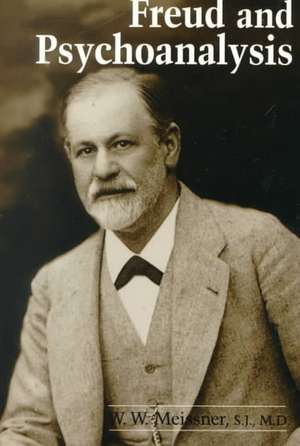Freud and Psychoanalysis: Gethsemani Studies in Psychological and Religious Anthropology
Autor W. W. Meissner S.j. M, Ernest Daniel Carrereen Limba Engleză Paperback – 8 iul 2000
Preț: 277.53 lei
Nou
Puncte Express: 416
Preț estimativ în valută:
53.11€ • 56.79$ • 44.28£
53.11€ • 56.79$ • 44.28£
Carte tipărită la comandă
Livrare economică 18 aprilie-02 mai
Preluare comenzi: 021 569.72.76
Specificații
ISBN-13: 9780268028558
ISBN-10: 0268028559
Pagini: 296
Dimensiuni: 153 x 230 x 22 mm
Greutate: 0.45 kg
Ediția:1
Editura: MR – University of Notre Dame Press
Seria Gethsemani Studies in Psychological and Religious Anthropology
ISBN-10: 0268028559
Pagini: 296
Dimensiuni: 153 x 230 x 22 mm
Greutate: 0.45 kg
Ediția:1
Editura: MR – University of Notre Dame Press
Seria Gethsemani Studies in Psychological and Religious Anthropology
Recenzii
“Meissner (Boston College) offers one of the best summaries available of the development of Freud’s thought and of post-Freudian psychoanalytic developments. It is more advanced and more comprehensive in treating Freud than Raymond Francher’s Psychoanalytic Psychology: The Development of Freud’s Thought (CH, Mar’64) and David Stafford-Clark’s What Freud Really Said (CH,Oct’67) ... Meissner’s is now the book to recommend to upper-division undergraduates through faculty for a comprehensive survey of psychoanalytic thought.” —Choice, Vol. 38, No. 3, January 2001
“This relatively short book is really a primer on psychoanalysis, along the lines of Brenner’s (1955) and Waelder’s (1960) classic texts. Although similar to these books in offering an overview and explanation of Freud’s theories, it has the advantage of summarizing the post-Freudian development of psychoanalysis as well, particularly recent thinking. . . . an excellent resource for teaching. . . . The main strength of this book is that it provides a comprehensive yet succinct overview and critique of various schools of thought within psychoanalysis by someone who has spent a good part of his life thinking and writing about it.” —American Society for Adolescent Psychiatry
“[A] useful introductory manual on Freud’s basic theories and a brief overview of his psychoanalytic technique. [A]n interesting, informative, and readable survey of the basic tenets of psychoanalytic theory from a classical, scientific perspective.” —Journal of Phenomenological Psychology, Fall 2001, Vol. 32 No. 2
“Meissner summarizes the findings and theories of psychoanalysis in a contemporary context while emphasizing significant historical roots. He does so in a comprehensive way, covering and evaluating many important trends and theoretical perspectives. His book is thus an excellent compendium of many classical and modern views.” —Psychoanalytic Quarterly, January 2002
“Meissner’s Freud and Psychoanalysis gives a thorough and balanced view of its topic and renders difficult and complex material accessible an even inviting to the neophyte.”--Freud Studies
“Throughout the book, Meissner presents his complex material in clear, judiciously chosen language which, whilst often laden with jargon, is almost always accessible and intelligible. At his best, Meissner’s exposition of Freud is genuinely illuminating and stimulating.” The Heythrop Journal, January 2004, Vol. 45 No. 1
Notă biografică
W. W. Meissner, S.J., M.D., (1931-2010) was a Training and Supervising Analyst at Boston Psychoanalytic Institute, University Professor of Psychoanalysis at Boston College, and former Clinical Professor of Psychiatry at Harvard Medical School. He is the author of several books, including The Therapeutic Alliance (1996), Treatment of Patients in the Borderline Spectrum (1998), and Psychoanalysis and Religious Experience (1984).
Ernest Daniel Carrere has been a Trappist monk at the Abbey of Gethsemani for over thirty years. He holds a doctorate in psychological and religious anthropology from Emory University and a JD from Tulane University.
Ernest Daniel Carrere has been a Trappist monk at the Abbey of Gethsemani for over thirty years. He holds a doctorate in psychological and religious anthropology from Emory University and a JD from Tulane University.
Descriere
Combining a comprehensive account of Freudian theory with a synthesis of contemporary psychoanalysis, this volume details the development of analytic theory. The author traces this evolution from the earliest stages of Freud's psychoanalytic thinking to developments such as relations theory.



